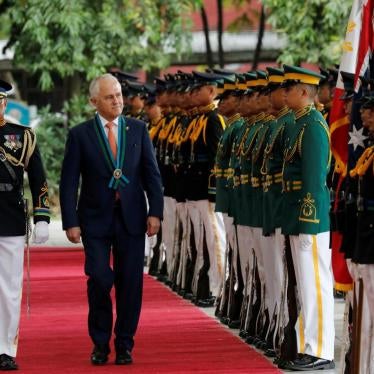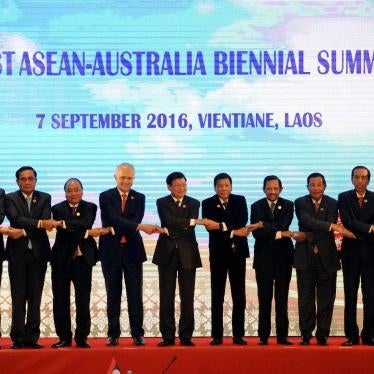Dear Prime Minister Turnbull,
We are writing to express our concern that human rights issues will not get consideration at the upcoming summit with leaders of the 10-country Association of Southeast Asian Nations (ASEAN) scheduled for March 17-18, 2018, in Sydney.
As you know, this is the first time Australia is hosting a summit with ASEAN in Australia. We recognize that your government has an interest in forging closer trade and security ties with ASEAN members. At the same time, a number of ASEAN leaders preside over governments that deny basic liberties and fundamental freedoms. These governments routinely commit serious human rights violations, crack down on civil society organizations and the media, and undermine democratic institutions by allowing corruption to flourish. Lack of accountability for grave abuses by state security forces is the norm throughout ASEAN.
In particular, we are concerned about the participation in the summit of such leaders as:
- Prime Minister Hun Sen, who carried out a coup in 1997, has ruled Cambodia abusively for over 30 years and in the past year severely cracked down on the political opposition, independent media, and civil society groups. On February 21, Hun Sen publicly threatened violence against potential protesters in Australia who burn effigies of him, saying, “I will follow you all the way to your doorstep and beat you right there.… I can use violence against you.”
- Prime Minister Gen. Prayut Chan-ocha of Thailand, who seized power in a 2014 military coup and has since led a military junta that has denied Thais fundamental rights to free expression, peaceful assembly, and freedom of association. The junta has repeatedly put off elections for a genuinely civilian democratic government.
- President Rodrigo Duterte of the Philippines, who has carried out a “war on drugs” that has resulted in more than 12,000 extrajudicial killings by security forces and their agents since taking office in June 2016. Senior officials may be responsible for inciting and instigating crimes against humanity in the anti-drug campaign.
- Myanmar’s President Htin Kyaw and State Counsellor Aung San Suu Kyi, who have presided over a campaign of ethnic cleansing and crimes against humanity against Rohingya Muslims, forcing more than 688,000 Rohingya to flee to neighboring Bangladesh since August 2017.
We are concerned that the summit will send a message to ASEAN governments and the people of the region that human rights are a lower priority than other economic, political, or security issues. Without a strong human rights component, the summit will add to the international standing of abusive and authoritarian leaders, while providing a propaganda coup for them at home.
To ensure that human rights are a core component of the summit, Human Rights Watch offers these recommendations:
- First, we urge you as host to place human rights and democratic rule officially on the agenda to be discussed at the summit. Relevant agenda items should include: holding free and fair elections throughout ASEAN; excessive restrictions on civil society groups; freedom of expression, association, and peaceful assembly; abuses against human rights defenders and other activists; accountability for serious violations of international human rights and humanitarian law; women’s rights; and rights of lesbian, gay, bisexual, and transgender (LGBT) people.
- Second, you should take steps to ensure civil society participation in the summit by holding sessions in which governments hear directly from leaders of civil society groups, including human rights organizations from the region. Civil society groups should also be invited to attend the government forums as observers.
- Third, your government should communicate to ASEAN governments that they if they do not take steps to release political prisoners and drop charges against those facing politically motivated prosecutions, these issues will be raised during the summit and with the media.
The Australian government’s increasing diplomatic involvement in Asia can be a force for positive change if the promotion and protection of human rights and democratic rule are consistently made a priority. In the ASEAN context, this means demonstrating a willingness to raise human rights issues even when other governments do not want those issues raised, and ensuring that Australian diplomatic partnerships go beyond traditional government-to-government relations, so that Australia is not only making common cause with ASEAN leaders but also with the 615 million people who live in the ASEAN region.
Sincerely,
Brad Adams
Asia Director
Elaine Pearson
Australia Director
CC: Foreign Minister Julie Bishop MP








